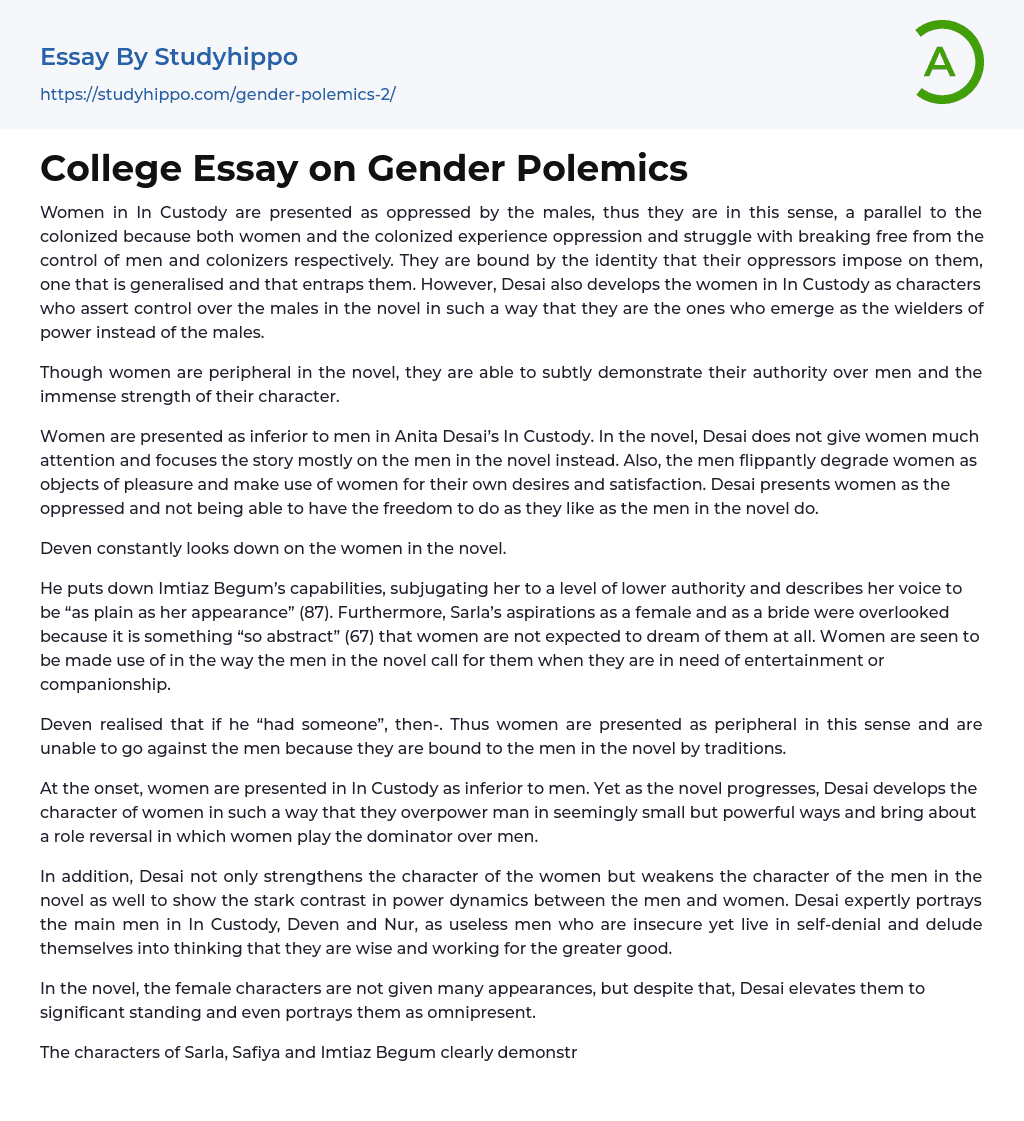In Anita Desai's In Custody, women are portrayed as being oppressed by males, which parallels the experience of being colonized. Both women and the colonized struggle to break free from control imposed upon them by their oppressors. Women in the novel are limited by the identity that men impose on them, which entraps them. However, Desai also develops female characters who assert control over men and emerge as wielders of power. Despite being peripheral characters, women subtly demonstrate their authority over men and showcase their immense strength. The novel portrays women as inferior to men, with men degrading them as objects of pleasure and using them for their own satisfaction. Deven, the male protagonist, constantly looks down on the women in the story, ridiculing Imtiaz Begum's capabilities and subjugating her to lower authority by describing
...her voice as "plain" (87).The women in In Custody are often overlooked, as their aspirations as females and brides are seen as too abstract for them to dream of, according to the novel's male characters. Women are made use of by men for entertainment and companionship. This implies that women are peripheral and cannot go against men because they are bound by tradition. Initially in the novel, women are portrayed as inferior to men; however, Desai develops the female characters in such a way that they overpower men in small but powerful ways, ultimately leading to a role reversal where women dominate men. Desai also weakens the male characters' significance, including Deven and Nur, portraying them as insecure and delusional. While the female characters have few appearances in the novel, Desai portrays them as omnipresent and elevates them to significant
standing.
Desai's In Custody challenges gender stereotypes through the strong female characters of Sarla, Safiya, and Imtiaz Begum. These women hold power over males and can command them to do their bidding. Sarla, for example, can effortlessly command Manu to "go fetch (his) books" (69). The authority she exerts at home and over Manu is something that Deven is unable to achieve. Similarly, Imtiaz Begum reduces Nur to a state of fear and submission through her use of imperatives towards him. She even commands Deven to perform menial tasks such as fetching water and washing the floor. Although women in the novel are seemingly peripheral to the story, they display their superiority over men in their homes where they feel most comfortable. The colonized people also assert their authority over the colonizers through strikes and refusal to work.In Custody depicts Desai's portrayal of women as powerful figures who are initially underestimated. This parallels the colonized's fight for authority over their oppressors. Desai presents women in two extremes in their approach to tradition. Some actively strive to break free from traditional stereotypes, while others remain passive and unable to escape from tradition's constraints. This contrast is exemplified by the characters of Imtiaz Begum and Sarla, who serve as foils to each other. Through this dichotomy among women, Desai highlights the diversity within a shared group of people who can experience similar circumstances yet have different attitudes towards it. Sarla embodies the passivity of traditional Indian women who are unable to progress in life due to conforming to societal expectations. In contrast, Begum represents those who refuse to be held down by societal conventions and are
constantly struggling to break away from them. Ultimately, Sarla's unrealized aspirations lead her to become subservient, internalizing patriarchal oppression leading ultimately to "disappointment" (68).
Imtiaz Begum challenges the authority of men and performs tasks that are typically reserved for men. Despite her lack of formal education, she gives her poems to Deven to prove her worth, having learned to read and write through the effort of "finding and seizing" knowledge. Her actions reflect the desire to break away from traditional roles and expectations, a sentiment frowned upon by society as disrespectful. Women seeking independence are analogous to the struggle of the colonized, as they divide into those who conform to imposed traditions and those who resist. Both seek individual identities that break from societal norms and restrictions.
- Social Construction of Gender essays
- Feminism essays
- Animal Rights essays
- Animal Testing essays
- Bullying essays
- Abortion essays
- Abuse essays
- Immigration essays
- Poverty essays
- Human Rights essays
- Inequality essays
- Violence essays
- Torture essays
- Crash essays
- Assault essays
- Racism essays
- Prejudice essays
- Controversial Issue essays
- Cyber Bullying essays
- Women's Suffrage essays
- Women'S Rights essays
- Women Empowerment essays
- Sojourner Truth essays
- Bullying In Schools essays
- Pro Choice essays
- Pro Life essays
- Should Abortion Be Legal essays
- Against abortion essays
- Abortion Debate essays
- Abuse Support essays
- Child Abuse essays
- Alcohol Abuse essays
- Physical Abuse essays
- Sexual Abuse essays
- Substance Abuse essays
- Migration essays
- Human Migration essays
- Illegal Immigration essays
- Immigrants essays
- Refugee essays
- Overpopulation essays
- Homelessness essays
- Hunger essays
- Dumpster Diving essays
- Homelessness In America essays
- Euthanasia essays
- Assisted Suicide essays
- Censorship essays
- Gun Control essays
- Empowerment essays




